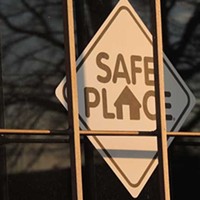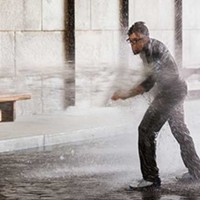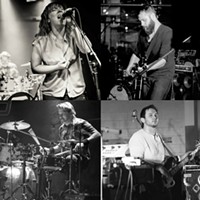Where does a young lesbian, gay, bisexual, or transgender kid go to feel safe and be with a supportive community of people who understand?
For Tonda Taylor, a Charlotte native from a prominent Myers Park family in the 1950s and '60s, that sanctuary was New York City, where she fled in order to feel safe as an out lesbian. Fortunately, Taylor returned home in 1991 with a mission to help other LGBTQ youth. And the impact of the organization she founded, Time Out Youth, on the lives of our city's most vulnerable young people over the past quarter-century, is immeasurable.
In this week's cover story, "The Safe Haven," CL news editor Ryan Pitkin attempts to measure that impact, talking with kids and staff at the Time Out Youth (TOY) facility in NoDa, which will soon move from its current location to a space more than twice its size.
TOY not only offers sanctuary for LGBTQ youth who face bullying and abuse at home and school, but its staff works to educate teachers, health care professionals and, soon, homeless shelter employees on how to work with these young people in ways that are supportive and respectful. Last year alone, TOY provided LGBTQ competency training to 4,000 Charlotte-Mecklenburg Schools employees.
"When I was having problems with school — because my school administration is kind of bad — [TOY] helped with everything," one transgender teen tells Pitkin. "It felt so good because I didn't have any advocates at my school. They were able to go in and advocate for me."
Where do you go when you want to feel safe?
The idea of safe spaces has been ridiculed by the right — with childish folks quick to bully anyone speaking of trigger warnings, deeming them "snowflakes" — but it's a question everyone asks themselves from time to time. I go spend time with my spiritual community at the Unitarian Universalist Church of Charlotte, whose mission is to work for social justice issues in our community and whose goal is to treat all people with dignity. Being with that community makes me feel protected.
Or, I'll hang around my brothers and sisters in recovery at 12-step meetings, which provide sanctuary for people on similar paths all across the city every day from morning to evening. Or, I'll go be with people who enjoy experiencing live music together in small clubs like Petra's in Plaza Midwood or the Evening Muse in NoDa.
Last week, I spent time with two members of Radio Lola, a Charlotte band that plays at those venues and has just released its debut album, The Burden in our Bones. It's a powerful set of eight soulful, blues-based songs exploring topics ranging from the pain of abusive relationships to the joy of steamy sex. You can read my profile of the band, "In the Raw," in this week's music section.
Some Charlotteans seek safety at family gatherings, others at protests, where likeminded friends and strangers unite to fight injustices. Even in environments that can potentially turn violent, there's a sense of safety in knowing that you're not the only one who feels passionately about something.
In the arts section of this week's CL, Pat Moran talks with the protest artists included in the McColl Center's new exhibit The World is a Mirror of My Freedom. One of them, Dread Scott, is the artist who was famously criticized by the first President George Bush for a provocative piece Scott did in the late 1980s on the meaning of the American flag. Among Scott's works at the McColl Center is "A Man was Lynched by the Police Yesterday," which recreates an NAACP flag used as part of an anti-lynching campaign in the 1920s, and "Fragments of a Peculiar Institution," a collection of photos and other documents on slavery.
One of Scott's photos is of a Civil War historic marker right across the street from the McColl Center here in Charlotte that refers to "President" Jefferson Davis. It shocked Scott. "If I went to Germany," he says in "Holding a Mirror up to Oppression," Moran's arts feature, "there might be something marking Hitler's last meeting with the Reich, but they wouldn't call him 'Chancellor' Hitler."
Where do you find safety in an increasingly unsafe America? It's a serious question today, but in this week's CL, we offer some options for you right here in Charlotte.



